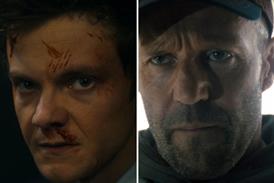
Philip Knatchbull is back at the helm of leading UK arthouse distributor-exhibitor Curzon, the company he ran for almost 20 years.
Knatchbull acquired Curzon in 2006, sold it to Charles Cohen’s US-based Cohen Media Group in 2019 and stepped down as chief executive officer in 2023.
Since then, he has been working on an autobiography called ‘Swallowtail’, which he describes as “a memoir about my life which includes the whole Curzon story” and has been travelling with his wife in India.
But when Fortress Investment Group, the US private equity firm that took over Curzon in November when the Cohen Media Group fell into financial trouble, he agreed to come back as interim executive chairman, taking over from Edward Fletcher who has left the company.
Curzon Cinemas has 16 cinemas and 46 total screens across the UK. It runs film distributor Curzon Film, the Curzon Home Cinema streaming service and, under Fletcher, revived the Artificial Eye brand. In 2024, it bucked market trends, posting an 8% rise in admissions year-on-year.
Knatchbull talks to Screen about his return to the company, his short-term goals and why he does not rule out staying at Curzon beyond the interim period.
Why did you come back?
I didn’t expect to come back but life is what happens to you when you are making other plans. This opportunity came along as a result of the change of ownership. What I have agreed to do is come back in an interim position just to see what [Fortress’s] vision and strategy for the company will be, and whether or not I can help.
The Artificial Eye brand was recently revived. Will you be keeping it?
When I was trying to build Curzon up as a company, I thought it was important to have one brand to communicate one idea to a customer and not confuse them. That is why it became Curzon Films and Curzon Cinemas and Curzon Home Cinema. But Artificial Eye still has a lot of love from a lot of older people – and it can be used to release certain films. It’s a very modest relaunch of the label.
What do you make of Vue coming into the indie distribution sector with Vue Lumiere?
I don’t see it as competition. I see it as a change in the mainstream operators’ attitude toward quality independent film and I welcome it. I hope it will be part of a recovery for independent film.
Picturehouse founder Lyn Goleby has returned to that company in the same position as you, as interim executive chair. Do you relish that competition?
We should be looking for as many partnerships as possible. If we could partner in some way with Picturehouse, that could be a positive thing. Equally, I am looking for partnerships outside the UK as well. The future is not just about UK rights: the future is about multi-territory rights.
Some of the studios and the streaming platforms like Mubi are buying multi-territory. The same thing should be done in partnering with distributors and partnering with like-minded cinema operators, be that with Picturehouse or European partners or further afield.
So you’re thinking on a more international level?
That’s one of the reasons why I set up the development company with Madman in Australia and Cineart in Belgium [the Curzon CM Development Fund] to start developing films which we can control and where we can take local distribution rights in our own territories.
We have 12 films in development. We have had four films go into production. The last two have been Bad Apples, the Saoirse Ronan film, and The Ballad Of A Small Player, directed by Edward Berger and starring Colin Farrell.
Are there new Curzon sites about to open?
We will almost certainly go ahead with the new cinema in Hammersmith. That should be finished by the end of March and we would make a positive decision to go in there in April or May. The same with the Curzon Chelsea. That closed six or seven years ago. It has had a huge redevelopment. I am talking to Fortress about how best to make sure we can fulfil that to become another flagship for the Curzon group.
Are you still championing day-and-date releasing at Curzon?
The reason that strategy developed was, at that time, arthouse films were finding it extremely hard to get bookings into the multiplexes. We couldn’t justify the p&a spend because we didn’t know how many screens or for how long we would play. Day-and-date releasing became a strategy out of necessity.
What has changed is each film now has to be dealt with on a bespoke basis. There may be some films right for day and date and there may be some that need or want a 90-day window.
Is the increase in the rate of National Insurance to be paid by employers impacting Curzon?
Yes, it has caused a big problem. It’s the combination of higher rents, higher business costs, utility costs going through the roof with the energy crisis and now this National Insurance uplift. That is combined with the problem of high-ticket prices. You have ticket prices commensurate with the costs you are running. Don’t forget, included in every ticket is a 20% VAT tax.
What is the Fortress Investment Group like to work with?
Certainly in my experience to date, they’re very good to deal with. They listen. They’re very keen on creating the maximum value that they possibly can. They probably are a slightly reluctant buyer. They were owed a lot of money and want to try to recoup as much as they can, quite understandably. But they’re more than that. They’re willing to invest, I believe, in the business, to grow it so they can in three or four or five years, have a really good opportunity [to] recoup a large part of the debt they were owed. They also owned the Alamo Drafthouse [US cinema chain] which they sold very successfully to Sony [Pictures Entertainment in 2024].

What changes have you noticed in the industry since your return?
There has been a much slower recovery than anyone expected and people have got out of the habit of going to the cinema. The good news is there is a younger audience coming into cinema which is incredibly positive, a new audience is coming for the first time.
The heyday of Michael Haneke, Lars Von Trier and Abbas Kiarostami, all those great directors, those arthouse films of the past, are going to find it difficult to get the younger audience out but there are lots of new interesting indie films coming down the line that are attracting young audiences.
Do you mean films like Kneecap, supported by Curzon through the Mother Tongues award for foreign-language UK films?
What excited me about Kneecap was the energy. It reminded me of A Hard Day’s Night, that kind of visceral energy. It was subversive, it was different. That is certainly an unusual film for me and Curzon to have got behind so early and we want to do more of them.

























No comments yet